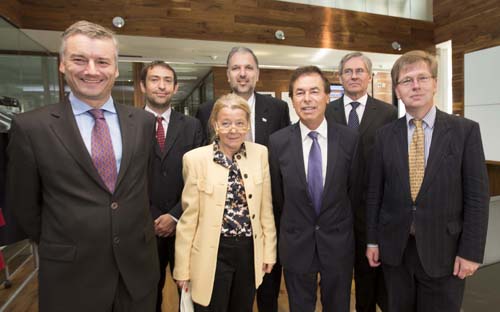Trinity Hosts Ireland’s First Conference in Honour of Holocaust Rescuer, Raoul Wallenberg
Posted on: 02 October 2012
The Trinity Long Room Hub, the College’s arts and humanities research institute, recently hosted Ireland’s first academic conference on Holocaust rescuer, Raoul Wallenberg. Organised jointly by the Hungarian, Israeli and Swedish Embassies and Trinity’s Centre for European Studies to mark the centennial of the birth of the Swedish diplomat who rescued thousands of Jews during the Holocaust in Hungary, the conference was officially opened by the Minister for Justice, Equality and Defence, Alan Shatter, TD.
The conference ‘Man Amidst Inhumanity’ was dedicated to Wallenberg’s personality and activities during the war. Wallenberg saved thousands of Jews in Budapest in the last few months of World War II. Sent to Budapest by the War Refugee Board, he rented safe houses, issued protective passes, and took people off transport trains heading towards the concentration camps. Due to his courage and perseverance he managed to save many lives. Despite his pivotal role in the rescue operations, he suffered a tragic fate: he was arrested by the Red Army in January 1945, and he most likely perished in the Soviet Union.

Provost Patrick Prendergast with (front row from left) Elisabet Borsiin Bonnier, the Swedish Ambassador to Ireland, Minister Alan Shatter, TD, Prof Juergen Barkhoff, Director, Trinity Long Room Hub, (back row from left) Dr Balázs Apor, lecturer in European Studies, TCD, Boaz Modai, the Israeli Ambassador and Tamás Magyarics, the Hungarian Ambassador to Ireland.
Minister Shatter in his opening address described the conference as an act of memory and emphasized the significance of its moral dimension. Keynote lecturer, Dr Robert Rozett, Director of Yad Vashem Libraries and editor of the Encyclopedia of the Holocaust discussed Wallenberg in a historical context and tried to address the question why Wallenberg has received so much attention, from politicians and academics alike, as opposed to the other 24,000 Righteous Among the Nations.
The conference generally offered a comprehensive overview of diverse narratives – academic, political, aestheticised and subjective – about Wallenberg. Tim Cole from Bristol University addressed the spatial and social aspects of the rescue operations in Budapest; Tanja Schult, author of the much-acclaimed book A Hero’s Many Faces: Raoul Wallenberg in Contemporary Monuments provided a fascinating account of the representations of Wallenberg in popular culture; and Mária Schmidt, Director of the House of Terror in Budapest talked about how Wallenberg was selected to be in charge of the rescues in Hungary. In the last panel, that was chaired by Peter Cassels, Chairman of the Holocaust Education Trust Ireland, Dag Sebastian Ahlander, a former Swedish diplomat and author of children’s books about Wallenberg, shared his memories about the searches for Wallenberg in the Soviet Union conducted by the Swedish Embassy in Moscow. Renowned Israeli writer and Holocaust survivor Yaakov Barzilai ended the conference by reciting some of his poems.
